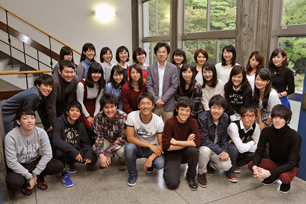Takaaki Chikamori, Associate Professor, Faculty of Letters
Training to See What Cannot Be Seen
The seminar, now in its fourth year, focuses on urban and cultural sociology.
It is an ideal place for the 36 students, a melting pot of individuality, to cultivate “sociological perspectives.”

Thinking about societies through “cities” and “cultures”—with this as the general theme, there is almost no limit to what students can research at my seminar. Past graduation theses have covered a wide array of themes—some serious, some light—related to social phenomena ranging from topics on urban space such as intergenerational communication in residential communities, reinventing the image of Odaiba, public spaces and art, and “Shinjuku Golden Gai”, to topics related to culture in our daily lives such as cooking shows, the booming joshikai [all girls get-together] phenomena, and theme restaurants.
These topics appear disconnected, but it requires a specific viewpoint to read and understand them. Conversely, the theme for the graduation thesis is decided only if it is conceived to be meaningful when seen from this viewpoint. What I am referring to here is sociological perspective, but this idea cannot be explained in just a few words. To try and put it simplistically, one may say that, as cultural anthropologists try to understand seemingly mysterious customs within a society they are investigating, it is the manner of perceiving the peculiarity of “norms” in the society we are embedded in as being indeed peculiar and trying to analyze the systems hidden inside them.
This sociological perspective cannot be cultivated in one day. In order to acquire this, I consider the group discussions conducted among the third- and fourth-year students particularly important. After a student gives a presentation of their research, the theme is broken down into two to three topics, and the class is divided into smaller discussion groups. With some jokes mixed in, the discussions usually become quite animated, but from time to time someone may suddenly come up with an eye-opening comment that broadens everyone’s perspectives. After repeating these types of discussions, students learn to understand what aspects of society are interesting from a sociological perspective.
I believe that these hangaku hankyo or learning while teaching and teaching while learning-style discussion sessions among diverse individuals that come together at my seminar are the most effective place (method) to learn about sociological perspectives.
Student’s Voices
Yuto Mori
Third-year Student, Faculty of Law, Department of Political Science
Questioning “Norms”
Scrutinizing popular trends or things that have become so “normal” people tend to overlook or no longer take into account—this is the study of sociology that we are undertaking research in. In Associate Professor Chikamori’s seminar, we mainly look at “normal” things in cultures and cities, so most of the research content is easy to follow, and the debate always gets heated during the group discussions held every class, which is based on one of our research presentations. It is not rare that a remark made in jest actually touches the core of the subject, or a comment that was meant to be funny is not funny at all. We are working hard at our studies under Chikamori-sensei’s supervision in this open and carefree environment.
*Position titles, etc., are those at the time of publishing.
